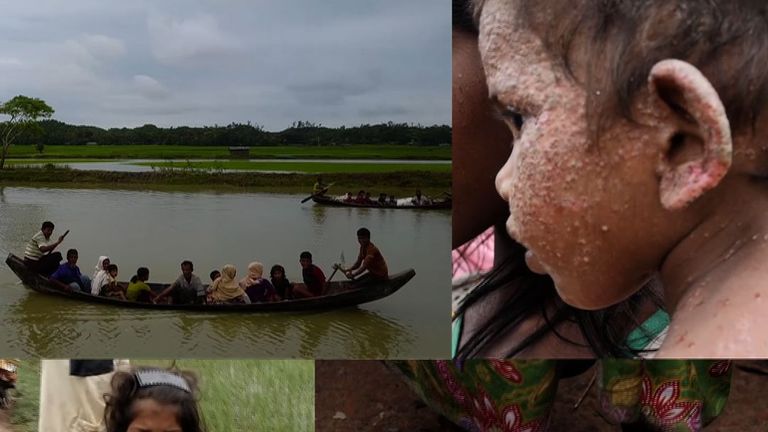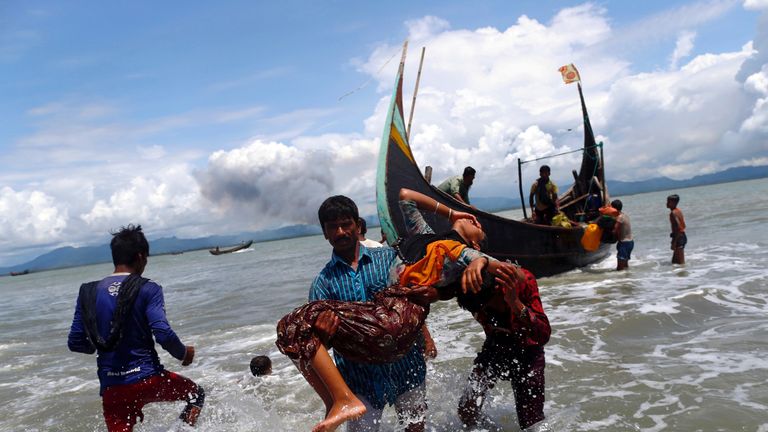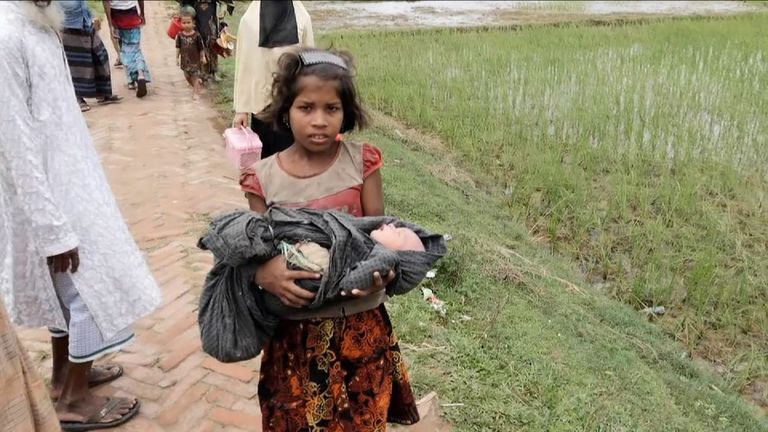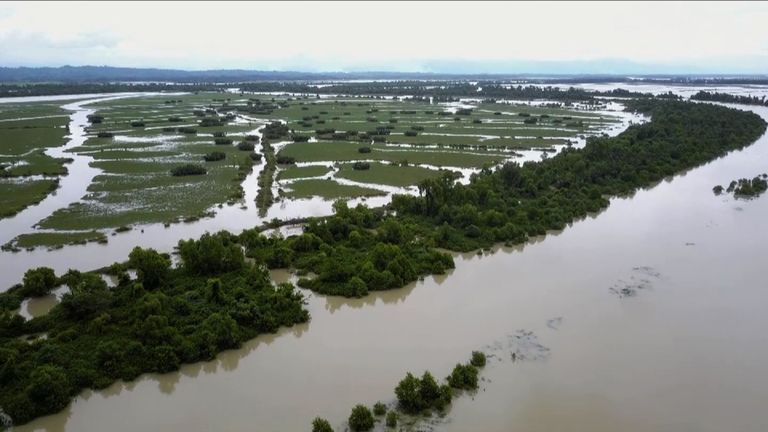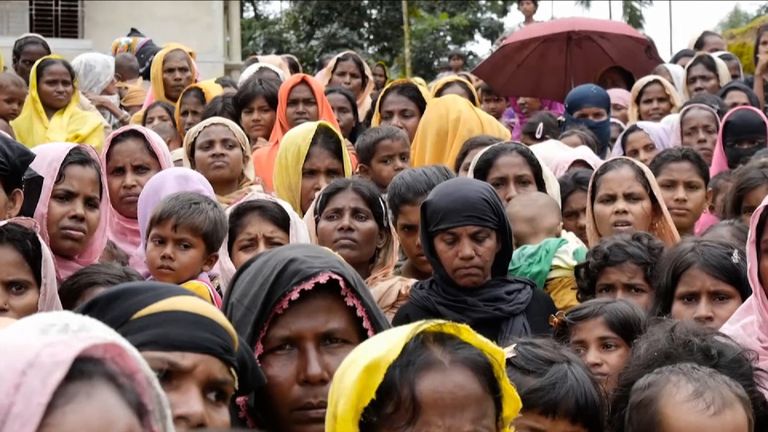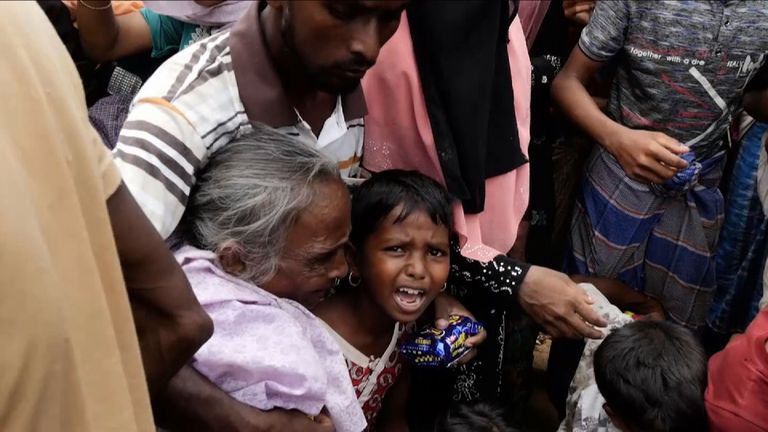Safe zone plea for Rohingyas fleeing violence in Myanmar
A mother escaping Myanmar tells Sky News two of her sons were shot dead by soldiers and two others died of starvation.
Tuesday 12 September 2017 18:17, UK
Bangladeshi Prime Minister Sheikh Hasina has urged Myanmar to set up safe zones to allow hundreds of thousands of Rohingya Muslims to return home.
Since August 25, more than 370,000 Rohingyas have fled Myanmar, claiming they were attacked and had their homes set on fire by security forces and Buddhist mobs.
The UN's top human rights official has described Myanmar's treatment of the Rohingyas as "a textbook example of ethnic cleansing", while the US has called on security forces "to respect the rule of law, stop the violence, and end the displacement of civilians from all communities".
While distributing aid to refugees, Ms Hasina urged Myanmar leader Aung San Suu Kyi to set up safe zones for Rohingyas and "stop this violence against innocent people".
She said: "Myanmar has created the problem and they will have to solve it. We want peaceful relations with our neighbours, but we can't accept any injustice."
Analysis: Ashish Joshi, Sky Correspondent, in Bangladesh
On the Bangladeshi border, Sky News has witnessed first-hand some of the devastation faced by Rohingyas fleeing Myanmar.
During an unscheduled stop at a small grocery store, producer Neville Lazarus, cameraman Pete Milnes and I saw plumes of smoke as we scanned the horizon to see where Bangladesh ended and Myanmar began.
I had heard Myanmar Army soldiers were still burning Rohingya villages but had not expected them to do it so openly, during the day and in full view.
I thought that by now, given the international outcry and the ensuing condemnation, the Myanmar Army would at least try and mask these atrocities under the cover of darkness.
But the truth is Myanmar's generals do not care what the world thinks. The accusations of ethnic cleansing and genocide do not trouble them.
A bystander, Mohammed Sayem, told me this village was home to some 6,000 people.
"The fire began two to three days ago," he said. "Are you sure?" I asked.
Myanmar's de facto leader Aung San Suu Kyi says we have been duped by Rohingya propaganda. The brutal slaughter taking place inside the secretive country is only action against a handful of "Muslim terrorists", she says.
So I asked again. "Are you sure?"
"Yes," he replied.
"With your own eyes?"
"With my own eyes, standing here," he said. "Look, I have the photos on my phone".
He swiped right on his phone to reveal a series of images. Flames, then dark smoke and then grey smoke. The time of day changed from dusk to daylight.
Suddenly, we hear a cry: "Rohingya!"
"Look," said Mohammed. "More Rohingya are coming now."
There in the distance we could see a line of people walking in single file, the men carrying poles on their shoulders tied with cloth bundles at each end. It's a popular way to carry heavy loads in the sub-continent.
We scrambled to try and intercept the refugees at a path we were told would lead straight into the village.
The first woman we met was Noor Khalim. She shared her story. Sadly, it is a familiar one of mass murder and arson.
Then she lifted her sarong to show me her feet. They were pink, the skin had peeled back and a little blood still oozed from healing scabs.
They had been badly scorched by the flames that engulfed her burning home. And on these bare, burned feet Noor Khalim had walked for days to reach Bangladesh.
We moved ahead towards the Naf River. There is a known crossing point where fishermen ferried across Rohingya refugees for money. I was to learn business is booming.
On the path walking towards us I could see a small girl, perhaps six or seven years old. In her arms she carried a tiny bundle.
That bundle was baby Mujahid, just five days old. Mujahid was pale, yellow in fact. He lay completely still.
His mouth was open, his pink lips breathing shallow, short breaths. It was immediately clear this newborn was very sick.
Following slowly behind was Mujahid's mother Rabia. Her complexion was the same as her baby's. But her lips were colourless except where they had cracked and bled.
Rabia could hardly raise her head and leant on a tall staff she carried for support.
She described how her village was burnt down by Myanmar soldiers and Buddhist vigilante mobs. She told me she had walked for five days straight after giving birth to her baby.
Mother and newborn were clearly very ill and needed urgent medical care. But where was that help going to come from?
Following a short way behind was Fatima Khatun. I thought I had heard stories of suffering and tragedy. But what I was about to hear would leave me broken.
"When we left our village there were seven of us all together," she said. "Me, my four sons and my two daughters. But we had a difficult journey through the mountains.
"On the way I lost my four boys. The 10-year-old and the five-year-old were shot dead by soldiers. The younger ones, aged two and three, died from hunger.
"They starved to death. I could not carry their bodies so I left them on the mountainside."
Fatima's youngest surviving daughter is about two or three years old. She was being carried on the hip of her older sister.
The toddler's skin was covered in blisters and a type of pox. Her feet were split with deep gashes, cuts that were still bleeding. Here was yet another child in need of urgent medical intervention.
But their journey to help, if they find any, will take a painfully long time. Fatima hobbled slowly with a pronounced limp, leaning on a crutch for support.
On reaching the river we put up a drone to film aerial views of the surrounding land. This watery escape route offers a way out from the hell that is now Rakhine state. We could see many boats carrying dozens of Rohingya families along the river.
From the AG百家乐在线官网, both sides of the river look exactly the same. The same trees, the same paddy fields. Myanmar and Bangladesh, here at least, are identical.
But there are differences between the people. And it is these differences that have led to the deep-rooted hatred that has seen the Rohingya being ethnically cleansed from their ancestral lands.
I doubt if the world's most persecuted people will ever be allowed to return.
